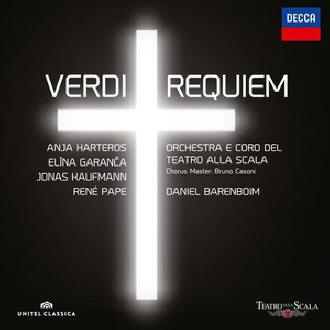|
|
|
|
|
|
|
|
|
The Times, September 13, 2013 |
| Geoff Brown |
|
|
|
Daniel Barenboim: Verdi Requiem |
|
|
|
Even the pauses tremble in Daniel Barenboim’s thrilling account of
Verdi |
|
|
 La
Scala in Milan housed the second performance of Verdi’s Requiem
in 1874, and was the venue for this superb recording La
Scala in Milan housed the second performance of Verdi’s Requiem
in 1874, and was the venue for this superb recording
Verdi’s Requiem, recorded last summer from the opera stage of La
Scala, Milan? What a perfect venue for such a sumptuously
dramatic piece. It was La Scala that housed its second
performance in May 1874, in the home city of Alessandro Manzoni,
the poet,
novelist and national hero, whose memory the
Requiem commemorates. And didn’t the conductor Hans von Bülow
label it at birth “an opera in church costume”? The comment was
meant as a criticism, but now it seems more like an honourable
truth. Verdi had composed some 25 operas by the time he started
his work; what was he supposed to do, throw all his knowledge of
musical drama into the River Po?
The opera link is
particularly strong with the personnel on parade here. Our
conductor is Daniel Barenboim, king of the Proms’ recent Ring
cycle, who adds numerous touches of melodrama to the score, not
always in the best of taste. The magnificent full-throated
chorus project in a manner liable to rip off the La Scala roof.
And the soloists too trail opera glory. Jonas Kaufmann, no less,
is the ringing tenor; Anja Harteros’s soprano wrenches the
heart; mezzo Elina Garanca supplies warmth and cream, while René
Pape’s bass stands firm, a bulwark against any storm. I should
also mention the La Scala orchestra’s bass drum player. None of
the dead could possibly stay slumbering after those mighty
thwacks in the Dies Irae.
All good, then? More or less.
In the Offertorio , Kaufmann, surprisingly, suffers one
intonation mishap, and generally seems rather less at home than
the others, though that never stops him fierily trumpeting with
every note, and tender beauties are still
floated on high.
Harteros reaches her own peak in the aching loveliness of the
final “Requiem aeternam”, her voice the rapturous embodiment of
the Requiem text’s “perpetual light”, while Garanca’s mezzo
shines throughout with a glow probably visible from outer space.
Barenboim, meanwhile, does everything to encourage bold
attack from players and singers; even his pauses tremble. All
told, it’s a thrilling account.
|
|
|
|
|
|
|
|
|
|
|
|
|
|
|
|
|
|
|